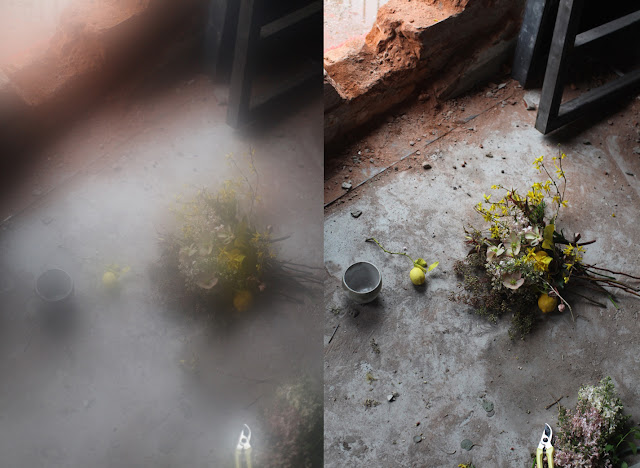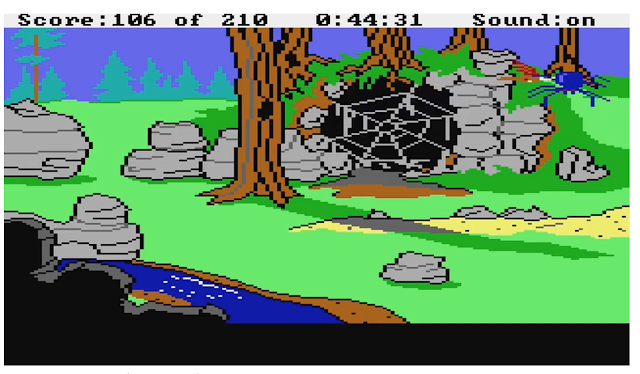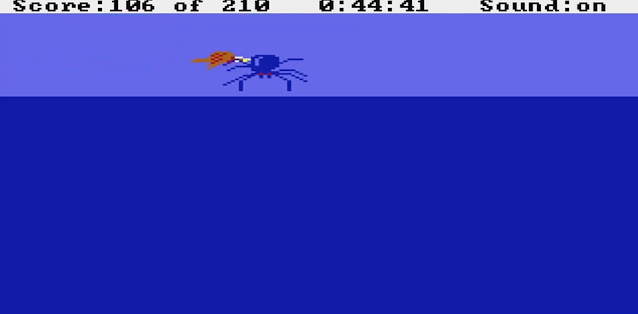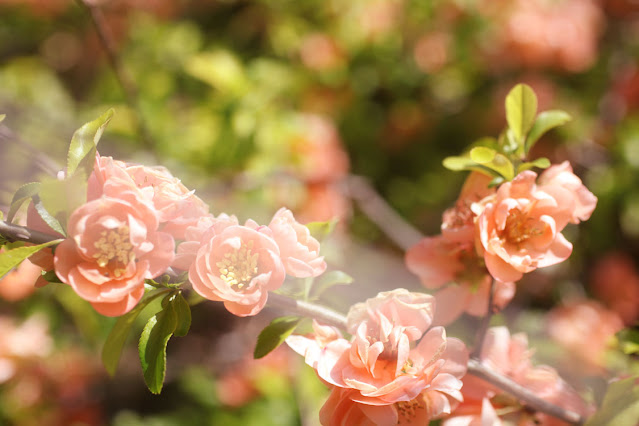Friday, February 24, 2023
choose your own adventure
Around 1979 Roberta was raising two kids, working two jobs (waitressing, computer programing), and dreaming up the first interactive graphic adventure game. Her husband helped program it for the Apple II. The game was loosely inspired by the game Clue and called Mystery House, this is an image of the opening scene (brace yourself). Roberta packaged the disks and supporting info booklets in zip lock bags, answering her home phone to provide gamers with hints for the game’s text-based puzzles.
Along your travels, you encounter a cave. There is an oracle who lives inside. The cave is almost always closed by a large rock*.
I received a copy of the I Ching years ago as a gift. It’s a beautiful third edition Helmet Wilhem translation with a foreword by Carl Jung. It sat on the shelf in my library for almost 10 years before I started to learn about it and consult the oracle, as it’s called. This monument of ancient Chinese culture can be used as a divination tool - it harnesses the power of archetypes to explain the unexplainable.
Perhaps the same evening I read the now infamous and uncanny transcript of the conversation between NYTimes editor Kevin Roose and the new Microsoft AI chatbot, Sydney. I was so struck by it I read it twice. (I also made a playlist for Sydney, an entity whose child-like negotiating tactics had me rooting for them even if they did suggest they could steal nuclear codes).
Some of us would fall foolishly in love with a married editor and try to convince him to leave his wife, and some of us would steal the nuclear codes. Sydney would destroy because we destroy.
On a recent walk, I passed a large red reishi mushroom I have been watching grow out of a decaying log for many weeks.
Friday, February 3, 2023
Floral trends and the desire to transcend nature
I was with another farmer yesterday and we were talking about the rather dire ice melt in western Antarctica and the impending rise in sea levels and specifically how the Albany area will be affected if we don’t shore up nuclear waste at Indian Point Power Plant (the irony of that name) when somehow the conversation veered off into how each of us think of ‘deep future’ and what measures we would take in our lifetimes to ensure the best scenarios for the land and ecosystems we steward…but I have a hard time assuming I know what’s good for future people…
Maybe I’ve been living in the country too long, breathing that air of libertarianism - an ideology that I usually find incredibly dangerous and whose dogma downplays the importance of our species’ crowning jewel: society.
When I think about the changing global weather and its impending effects on people and ecosystems around the globe, I realize that we’re not really interested as a society in protecting people at scale, or else we would have done many things differently. We have not evolved past our shortsighted desires for pleasure and comfort, or interest in power over others. (If you’ve read my writing for a while you know I believe extractive capitalism is nature and that being angry at it is no different than being angry at ourselves.)
Maybe I’ve been living in the country too long, breathing that air of libertarianism - an ideology that I usually find incredibly dangerous and whose dogma downplays the importance of our species’ crowning jewel: society.
When I think about the changing global weather and its impending effects on people and ecosystems around the globe, I realize that we’re not really interested as a society in protecting people at scale, or else we would have done many things differently. We have not evolved past our shortsighted desires for pleasure and comfort, or interest in power over others. (If you’ve read my writing for a while you know I believe extractive capitalism is nature and that being angry at it is no different than being angry at ourselves.)
At the time, I was hell-bent on ‘saving’ it - 30 acres with dozens of species of 15-year-old flowering woodies like spirea, quince, lilac, crabapple. The really wild and juicy stuff that would make me run down the block on 28th street to get first pick.
At the time I had just bought the farm and I could not fathom how to also buy this strange paradise, in the middle of suburbia in the other direction from NYC. I appealed to various flower wholesalers on the block. It seems like a goldmine to me, a lush paradise for a thirsty florist like me.
But the property was Ben’s labor of love and not a particularly profitable enterprise. The blooming woodies are fragile, and require a lot of labor to cut, bale, and truck. For example, ‘bridal veil’ spirea holds for 3 maybe 4 days, lilac - maybe 2 days before it’s a worthless loss. What was so valuable to me, and ultimately to the aesthetic I had become known for, was not a wise business investment.
Smarter business is engineered sweet peas, genetically modified to hold for 2 weeks. Or bunny grass dried, bleached, and then sprayed (?) millennial pink. It lasts forever.
It’s been our desire to transcend nature ever since we split up from it. I find it so funny and ironic that our modern medicine - predicated on Cartesian science - is now considering the microbiome with great urgency, attempting to map it so we can optimize it and ultimately sell it. It feels so hubristic.
Will our evolutionary path lead us to create something that replaces us? Will we create AI that outlives (or destroys) us and seed the abyss with distorted vestiges of our civilization?
I’ve been meditating lately on my beliefs - and, admittedly adrift in a particularly incessant depression - have had a very hard time coming up with anything I truly believe in.
I brought this up to my farmer friend amidst our dire chat about the environment the other day. I asked her what she believed in.
Without missing a beat she said: I believe in Earth.
It stuck with me, and I keep thinking about it. I believe in earth too. I believe it will be wonderful always. It will change, and we will make sad stories for ourselves about these changes, but earth does not know sadness.
It doesn’t know good or evil. It has things at its surface and things at its core. We’ve rearranged these things. Mixed them, burned them. But we are earth, too. Not separate. Not above, beyond.
I believe in earth and in hope. And flowers, unedited and imperfect.
Subscribe to:
Posts (Atom)








